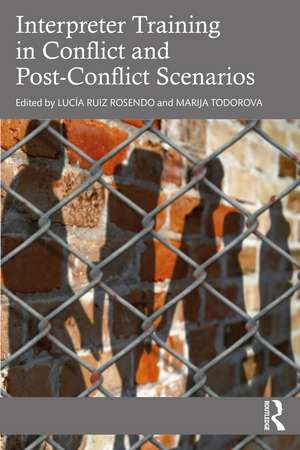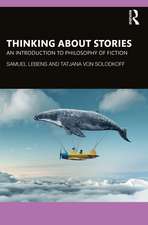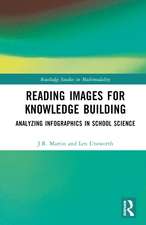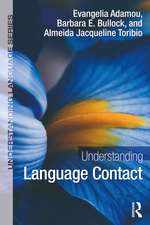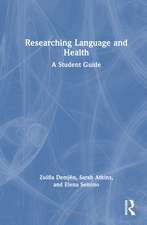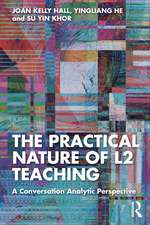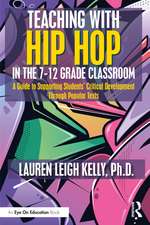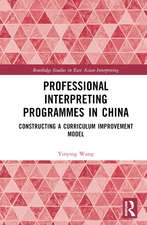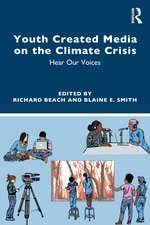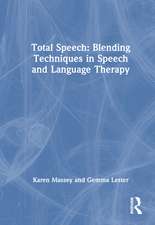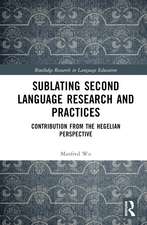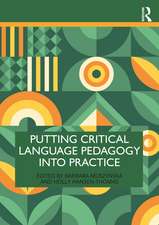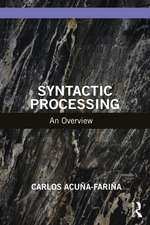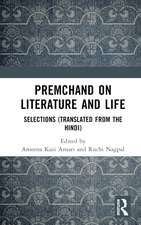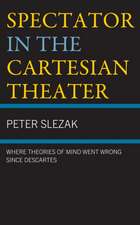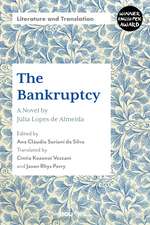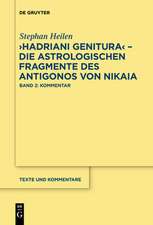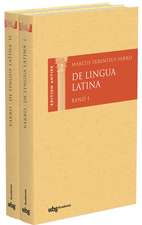Interpreter Training in Conflict and Post-Conflict Scenarios
Editat de Lucía Ruiz Rosendo, Marija Todorovaen Limba Engleză Paperback – 29 noi 2022
This volume is structured around interpreter training in different contexts of conflict and post-conflict, from military operations and international tribunals to asylum-seeking and refugee, humanitarian, and human rights missions. Themes covered include risk management and communication, ethics and professional demeanour, language technology and its use, intercultural mediation, training in specific contexts, such as conflict resolution and negotiation, and working with trauma. Chapters are authored by experts from around the world with a range of different profiles: military personnel, scholars, the staff of international organisations, and representatives from refugee and asylum-seeker-assisting institutions.
Interpreter Training in Conflict and Post-Conflict Scenarios is key reading both for students and scholars researching interpreting in conflict zones and conflict-related scenarios and for practising and trainee interpreters and mediators working for international organisations and the military.
| Toate formatele și edițiile | Preț | Express |
|---|---|---|
| Paperback (1) | 326.36 lei 3-5 săpt. | +22.16 lei 10-14 zile |
| Taylor & Francis – 29 noi 2022 | 326.36 lei 3-5 săpt. | +22.16 lei 10-14 zile |
| Hardback (1) | 885.03 lei 6-8 săpt. | |
| Taylor & Francis – 29 noi 2022 | 885.03 lei 6-8 săpt. |
Preț: 326.36 lei
Nou
Puncte Express: 490
Preț estimativ în valută:
62.50€ • 64.40$ • 52.36£
62.50€ • 64.40$ • 52.36£
Carte disponibilă
Livrare economică 01-15 februarie
Livrare express 21-25 ianuarie pentru 32.15 lei
Preluare comenzi: 021 569.72.76
Specificații
ISBN-13: 9781032136615
ISBN-10: 1032136618
Pagini: 238
Ilustrații: 5 Line drawings, black and white; 5 Illustrations, black and white
Dimensiuni: 156 x 234 x 17 mm
Greutate: 0.44 kg
Ediția:1
Editura: Taylor & Francis
Colecția Routledge
Locul publicării:Oxford, United Kingdom
ISBN-10: 1032136618
Pagini: 238
Ilustrații: 5 Line drawings, black and white; 5 Illustrations, black and white
Dimensiuni: 156 x 234 x 17 mm
Greutate: 0.44 kg
Ediția:1
Editura: Taylor & Francis
Colecția Routledge
Locul publicării:Oxford, United Kingdom
Public țintă
Postgraduate and ProfessionalCuprins
List of Contributors
1. Introduction
Lucía Ruiz Rosendo and Marija Todorova
Part I. Training interpreters for the military
2. Ethics in military interpreter training
Pekka Snellman
3. Military interpreter training for context-specific situations
Magnus Dahnberg
4. Training interpreters servicing China’s Peacekeeping Forces
Zerong Wei and Luo Tian
Part II. Training interpreters in the context of international organisations and tribunals
5. Developing interpreter competence: Training interpreters servicing UN field missions
Alma Barghout and Lucía Ruiz Rosendo
6. Resourcefulness when resources are lacking: A case study of field interpreters at the Office of the Prosecutor at the International Criminal Court
Nada Melhem, Nathalie Collart and Dimitri Elman
7. Main challenges of interpreting in the context of the international protection determination procedures
Michele Arcella
Part III. Training interpreters to work with refugees in national and regional contexts
8. Training needs of interpreters in the refugee crisis in Africa
Ebenezer Tedjouong and Marija Todorova
9. Interpreting for vulnerable populations: Training and education of interpreters working with refugee children in the United States
Indira Sultanić
10. Interpreter training in an asylum context
Sonja Pöllabauer
11. Ethics and training of interpreters in the asylum context
Fabrizio Gallai
12. Technology affordances in training interpreters for asylum seekers and refugees
Mariachiara Russo and Nicoletta Spinolo
Part IV. Crosscutting implications of interpreter training in conflict and post-conflict scenarios
13. Interpreting trauma: Service providers’ and interpreters’ perspectives
Simo K. Määttä
14. The psychological implications of interpreting in conflict zones, elements for potential mental-health and self-care training for interpreters
Eleonora Bernardi
15. Enhancing short term memory for conflict zone interpreters
Anjad A. Mahasneh
1. Introduction
Lucía Ruiz Rosendo and Marija Todorova
Part I. Training interpreters for the military
2. Ethics in military interpreter training
Pekka Snellman
3. Military interpreter training for context-specific situations
Magnus Dahnberg
4. Training interpreters servicing China’s Peacekeeping Forces
Zerong Wei and Luo Tian
Part II. Training interpreters in the context of international organisations and tribunals
5. Developing interpreter competence: Training interpreters servicing UN field missions
Alma Barghout and Lucía Ruiz Rosendo
6. Resourcefulness when resources are lacking: A case study of field interpreters at the Office of the Prosecutor at the International Criminal Court
Nada Melhem, Nathalie Collart and Dimitri Elman
7. Main challenges of interpreting in the context of the international protection determination procedures
Michele Arcella
Part III. Training interpreters to work with refugees in national and regional contexts
8. Training needs of interpreters in the refugee crisis in Africa
Ebenezer Tedjouong and Marija Todorova
9. Interpreting for vulnerable populations: Training and education of interpreters working with refugee children in the United States
Indira Sultanić
10. Interpreter training in an asylum context
Sonja Pöllabauer
11. Ethics and training of interpreters in the asylum context
Fabrizio Gallai
12. Technology affordances in training interpreters for asylum seekers and refugees
Mariachiara Russo and Nicoletta Spinolo
Part IV. Crosscutting implications of interpreter training in conflict and post-conflict scenarios
13. Interpreting trauma: Service providers’ and interpreters’ perspectives
Simo K. Määttä
14. The psychological implications of interpreting in conflict zones, elements for potential mental-health and self-care training for interpreters
Eleonora Bernardi
15. Enhancing short term memory for conflict zone interpreters
Anjad A. Mahasneh
Notă biografică
Lucía Ruiz Rosendo is an associate professor at the University of Geneva’s Interpreting Department. She has co-edited Interpreting Conflict (Palgrave 2021). Her research has appeared in Linguistica Antverpiensia, Target, War & Society and Armed Forces & Society, among others. She is the coordinator of the project AXS.
Marija Todorova is a research assistant professor at the Department of Translation, Interpreting, and Intercultural Studies at Hong Kong Baptist University. She has authored Translation of Violence in Children’s Literature (Routledge 2022) and co-edited Interpreting Conflict (Palgrave 2021). She is editor of New Voices in Translation Studies.
Marija Todorova is a research assistant professor at the Department of Translation, Interpreting, and Intercultural Studies at Hong Kong Baptist University. She has authored Translation of Violence in Children’s Literature (Routledge 2022) and co-edited Interpreting Conflict (Palgrave 2021). She is editor of New Voices in Translation Studies.
Recenzii
Interpreters with experience of working in numerous conflicts and their aftermaths have repeatedly called for better training to prepare future language intermediaries for these challenging roles. For the first time, this volume draws together perspectives on interpreter training from a wide spectrum of organisations and conflicts into a collection that anyone who trains, recruits or prepares interpreters to operate in conflict and post-conflict settings should read.
Catherine Baker, University of Hull, UK
"the pioneering volume strongly contributes to our understanding of the essential role of interpreters in conflict and post-conflict scenarios, supported by a fascinating collection of revelations from narratives, surveys, interviews, case studies, and interpreter diaries. Recommendations are made to improve institutional recognition, develop adequate professionalisation support, bridge international criminal justice and non-Western languages and cultures, and ultimately the need to standardise institutional training. With its clear merit of multilingual inclusiveness and geographical diversity, this insightful book is thus an invaluable asset for readers interested in conflict resolution, peacebuilding, interpreting studies, and beyond."
Ran Yi, UNSW Sydney, Australia in Interpreter training in conflict and post-conflict scenarios, Peacebuilding, DOI: 10.1080/21647259.2023.2187991
Catherine Baker, University of Hull, UK
"the pioneering volume strongly contributes to our understanding of the essential role of interpreters in conflict and post-conflict scenarios, supported by a fascinating collection of revelations from narratives, surveys, interviews, case studies, and interpreter diaries. Recommendations are made to improve institutional recognition, develop adequate professionalisation support, bridge international criminal justice and non-Western languages and cultures, and ultimately the need to standardise institutional training. With its clear merit of multilingual inclusiveness and geographical diversity, this insightful book is thus an invaluable asset for readers interested in conflict resolution, peacebuilding, interpreting studies, and beyond."
Ran Yi, UNSW Sydney, Australia in Interpreter training in conflict and post-conflict scenarios, Peacebuilding, DOI: 10.1080/21647259.2023.2187991
Descriere
This volume is structured around interpreter training in different contexts of conflict and post-conflict, from military operations and international tribunals to asylum-seeking and refugees, humanitarian and human rights missions.
